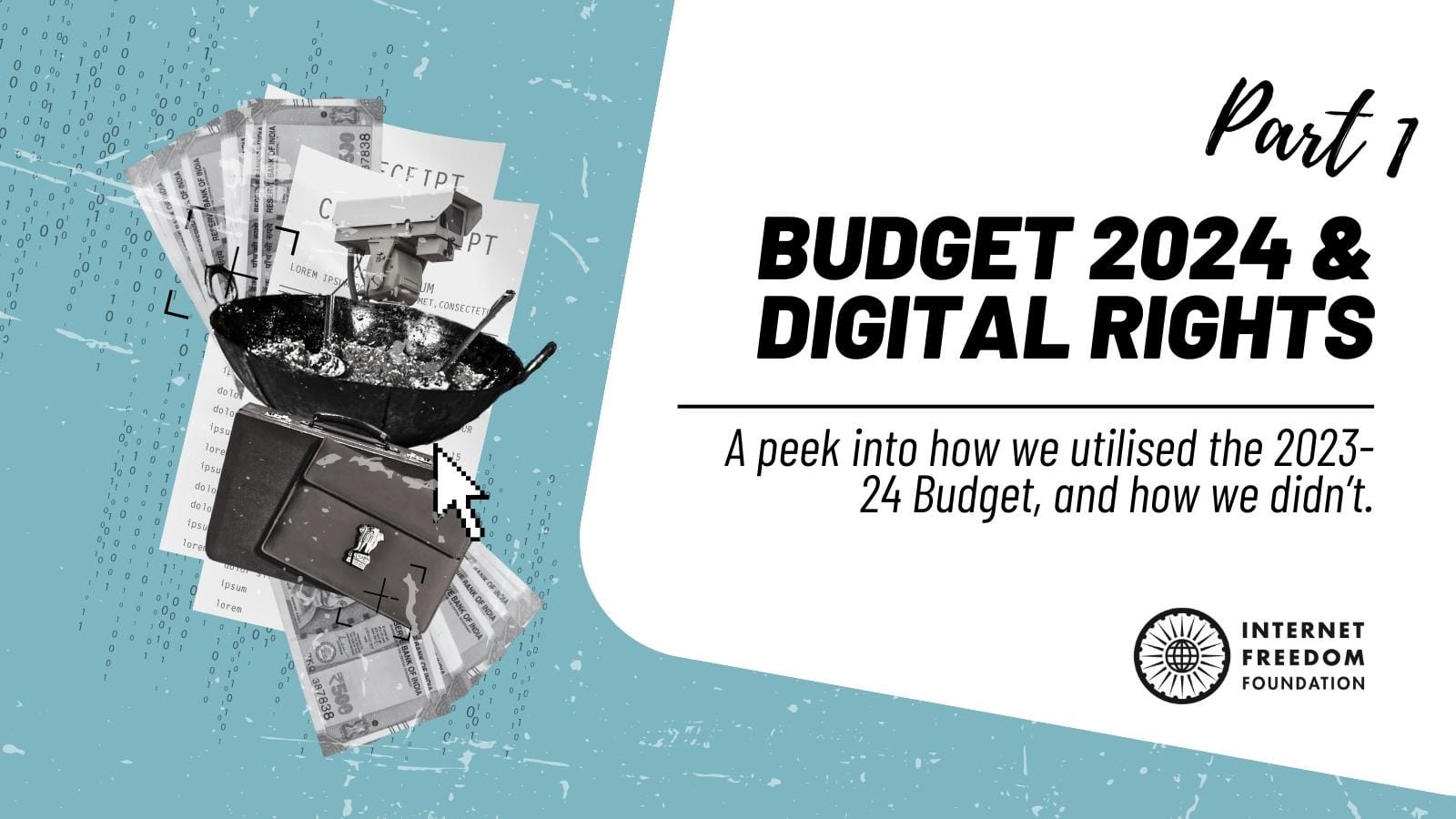
tl;dr
This post looks back on the 2023-24 budget announcements made by the Union Government across sectors on issues and schemes that implicate digital rights and freedom, and analyses to what extent the funds were utilised, the promises implemented, and what that means for the 2024-25 Union Interim Budget. We see that projections in relation to AI centres of excellence and 5G connectivity were not fulfilled last year, but that some developments were initiated in DPIs, digital identification, and data governance policies. Many of these projections will get carried forward to 2024 – but we urge the nodal ministries to invest in deeper research, assess systems preparedness and reconsider some aspects to ensure these policy developments do not jeopardise our privacy and constitutional rights.
Introduction
The Interim Budget for the Financial Year (“FY”) 2024-2025 was presented yesterday, February 1, 2024, by Union Minister Nirmala Sitharaman in the Lok Sabha during the parliamentary budget session which commenced on January 31, 2024 and is slated to conclude on February 9, 2024. The budget is an interim allocation of funds until India forms a new union government in the 2024 Lok Sabha elections, post which a full budget will be placed in both houses for deliberation again in July 2024. Further, there are plans to introduce 2 new bills in this session, namely the Public Examination (Prevention of Unfair Means) Bill, 2024 and the The Water (Prevention and Control of Pollution) Amendment Bill, 2024. A total of 26 bills are pending before the parliament.
This post is part one of IFF’s two-part analysis of the Union Budget, where we look back at the budget announcements made for FY 2023-24, and cast a critical eye on the status of implementation of funds allocated across some key IT and digital rights related schemes. A larger tabulation of budget utilisation across schemes and sectors is in the Department of Economic Affairs’ Implementation of Budget Announcements 2023-2024 report.
Scheme-wise analysis
Farming Digital Public Infrastructures
Budget was allocated for the development of digital public infrastructure (“DPI”) in the agriculture sector. Here, DPIs were posed to be an open source, open standard and interoperable public good with an objective to provide inclusive farmer-centric solutions, market intelligence, and support for growth of the agritech industry and start-ups. In FY 2023-24, this policy intervention was implemented to a small degree. Small use cases like geo-referencing of village map registry and crop sown registry have been finalised, and Digital Crop Surveys launched on pilot basis in 12 states. Architecture of three core registries including the farmer and crop registry has been finalised, and support registries have been developed.
The budget prioritisation of DPIs in agriculture runs on the assumption that it will help address problems of access, service quality and improve welfare measures for farmers. However, it is necessary to assess whether tech solutions are the most pressing need for the agriculture sector, and if it is, whether it should take the form of a DPI (see a detailed assessment of suitability of DPIs in public sectors here). Factors such as digital preparedness of the sector and the digital access and literacy rates among farmers should have been considered before making budget announcements for it. Further, the status of implementation of these DPIs has been weak and non-transparent. In the last year we have seen digital interventions in the PM KISAN scheme (like AI Chatbots) and pilots of digital crop surveys, but all of them have been deployed in an opaque manner, with MoUs and tenders not published by the Ministry of Agriculture, and the public-private nature of DPIs shrouding the parties from the Right to Information (“RTI”) Act, 2005. Before placing reliance on DPIs as “instrumental in formalisation of the economy”, like the Union Finance Minister did in her budget speech, there is a need to address core issues of accountability, ownership, transparency and digital literacy.
The Return of the National Data Governance Policy
For the past few years, the Ministry of Electronics and Information Technology (“MeitY”) has been working towards a National Data Governance Policy to reform open data in India and enable access to anonymized data for research and development purposes in the public and private sector. In the status implementation report, MeitY states that Draft National Data Governance Policy (“NDGP”) has been prepared and is under finalisation.
NDGP has been in the draft stage for close to two years. Even if adopted in 2024, IFF has made extensive submissions on why it falls short on many marks. The core principle and objective of the concept of open data is government transparency. On a reading of the NDGP, mentions of a “transparent and accountable data sharing ecosystem” seem merely ornamental. There are grievance redress systems envisioned, but no mention of how data sharing will help fulfil demands for accountability and redressal. Instead, the policy incentive behind opening up and monetising datasets seems to be maximising revenue generation. It is thus critical that effective approaches to balance the benefits and risks of open data are developed, to ensure that opening up data does not unduly compromise sensitive data. We (continue to) urge reconsideration of the policy and related infrastructures (such as the proposed Datasets Platform) before rolling it out.
#FutureSkills in Artificial Intelligence
Centres of Excellence (“CoE”) for research and development in Artificial Intelligence are being set up to facilitate MeitY’s vision of “Make AI in India and Make AI work for India”. In 2023, three CoEs were planned to be set-up in top educational institutions – but were not. CoEs aim to work towards solutions in agriculture, health, defence and manufacturing, and integrate robotics where appropriate. An Apex Committee, comprising industry and academia experts and sectoral ministry representatives, will be formed in 2024. A management unit at IIT Jammu has been established which will oversee the establishment of a CoE.
While an endeavour to research and develop new technologies is appreciated, the integration of AI and robotics in sectors which are unprepared for digital interventions or where the risk of harm through automation is too high, should be reconsidered. IFF submitted detailed comments on MeitY’s draft National Robotics Strategy, which relies on CoEs for building indigenous automated systems and integrating them across sectors. We recommended that MeitY conduct human rights impact assessments before implementing automated technologies, as some use cases can be intrusive and infringe on individuals’ privacy and other rights.
DigiLocker is not the key
Last year, there was interest in expanding the scope of identity verification through DigiLocker across Ministries. MeitY proposed using DigiLocker to establish a “one-stop solution for reconciliation and updating of identity and address of individuals maintained by various government agencies, regulators and regulated entities”, with Aadhaar as its foundational identity. In 2023, DigiLocker developed Application Programming Interfaces (APIs) for an address update feature and made it accessible to all partners/departments concerned. In 2024, MeitY will work with the Department of Revenue, Ministry of Road Transport and Highways, State Bank of India, ICICI, IDFC to integrate sectoral services with DigiLocker. This new system will be launched in 2024. Further, to enable more fintech services, the scope of documents available in DigiLocker will be expanded. There are also plans about building a fintech ecosystem within DigiLocker.
The expansion of Aadhaar-based services such as DigiLocker opens many avenues of privacy and exclusion based concerns. First, there is a long history of Aadhaar-related data leaks in India, which alludes to the lack of robust security measures at various government machineries which record Aadhaar information, and within the central Aadhaar database itself. Beyond the minimum security requirements, a higher degree of care is required when dealing with Aadhaar-related information, as the records include sensitive biometric data like iris scans, fingerprints and photographs. Second, the Aadhaar (Targeted Delivery of Financial and Other Subsidies, Benefits and Services) Act, 2016 deems biometric data to be ‘sensitive personal information’ and places strict prohibitions against sharing it, except in line with the provisions of the Act. It is also underscored in Puttaswamy II the scope of Aadhaar linking must be restricted to a limited set of purposes, which is not congruent with MeitY’s plan to expand DigiLocker’s scope on a grand scale. Finally, use of such platforms can be exclusionary (read IFF’s joint submission with Rethink Aadhaar).
Further, since the Union Government has deemed DigiLocker a DPI on a few instances in this implementation report, issues of accountability, ownership, transparency and digital literacy that we raised in use of DPIs in agriculture, also apply here.
Coming soon, 5G edition
As we move towards 5G connectivity, the telecom sector had announced establishing one hundred labs for developing applications using 5G services, as a starting point. At this stage, only tenders have been floated for delivery of technical equipment, and vendors selected for a few of them, who will start delivery from February 2024. It seems that for 5G services to be rolled out in the country, we will need some more time and investment – we are still at the stage of conducting awareness workshops for upskilling and mentoring students and startups about the potential of 5G. It remains to be seen if additional budget is allocated as the year progresses and we move towards building infrastructures to support 5G.
Read our analysis of the 2024-25 Union Budget in Part II here.

